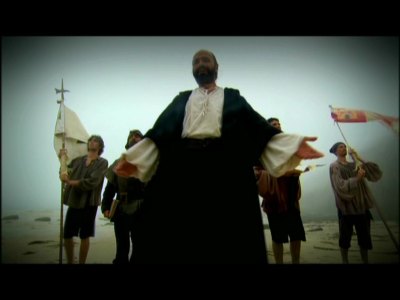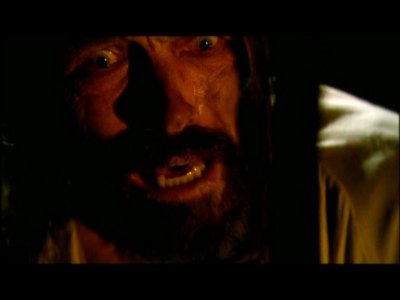| Reviews & Columns |
|
Reviews DVD TV on DVD Blu-ray 4K UHD International DVDs In Theaters Reviews by Studio Video Games Features Collector Series DVDs Easter Egg Database Interviews DVD Talk Radio Feature Articles Columns Anime Talk DVD Savant Horror DVDs The M.O.D. Squad Art House HD Talk Silent DVD
|
DVD Talk Forum |
|
|
| Resources |
|
DVD Price Search Customer Service #'s RCE Info Links |
|
Columns
|
|
|
Columbus - The Lost Voyage
The History Channel has released Columbus: The Lost Voyage, a beautifully shot, but fuzzily-focused dramatization of the famed explorer's little-discussed disastrous final voyage to the New World in 1502. Utilizing a standard History Channel documentary framework of "talking heads" historians and a narrator guiding the viewer along a timeline, padded out with on-location filmed re-creations of Columbus, his ships, and his destinations, Columbus: The Lost Voyage is certainly a pretty thing to view. And if you're not familiar with the explorer's later voyages, it's informative on a basic level. However, I was never sure exactly what its point of view towards Columbus was: was he a great, brave explorer, a madman, a genocidal plunderer? The documentary seems to point in all those directions, and yet skirts around its most basic function: making me and other viewers understand why these final voyages of Columbus were so important.

Columbus: The Lost Voyage actually spends a good portion of time discussing his previous three voyages, before moving on to his disastrous 1502 foray to the New World. Having gone to elementary school in the 1970s, our history lessons about Columbus had been updated to include the fact that Columbus hadn't actually landed at Plymouth Rock (as a little kid, didn't you always seem to get all that jumbled up, about who discovered America, who was here first, and why? And then they threw in Amerigo Vespucci and really confused you). Of course, none of the more unsavory facts about Columbus' venal searches for gold or his brutal term as governor of Hispaniola were mentioned, but the feeling that he had accomplished a daring and dangerous feat of exploration that no other man had attempted, was definitely conveyed to us at our little school desks.
I'm fairly certain I had previously heard that Columbus made other voyages to the New World (probably in some college history class), but honestly, I don't remember any details. And watching the two feature films that came out in 1992, celebrating the 500 year anniversary of his maiden voyage, didn't help much, either (laughed through the Tom Selleck one; slept through the Gerard Depardieu one). So I was looking forward to learning something from Columbus: The Lost Voyage. Of course, we all know now that Columbus died believing incorrectly that the lands he "discovered" (Haiti, the Dominican Republic, Venezuela) were actually part of Asia. And that his motives, despite all those years of elementary school history lessons to the contrary, were often less than honorable. A deeply complex, largely enigmatic historical figure, one only needs to surf the internet for a few minutes to realize that there will probably never be a consensus about Columbus' motives in discovering the New World. Thousands of historians have debated his contributions to world history and his impact, both positive and negative, on western civilization, and thousands more will no doubt continue to do so, as well.
And certainly, Columbus: The Lost Voyage is a prime example of that curious inability to pin down exactly Columbus the man. Plenty of facts are given out, to be sure, but what was he really all about, and more importantly from a historical viewpoint, how should he be viewed today? Experts such as Martin Dugard, the author of The Last Voyage of Columbus, Professor William D. Phillips, the author of The Worlds of Christopher Columbus, Dr. Mark Horton of Bristol University, Keith Pickering, a noted Columbus scholar, Dr. Lynne Guitar, an historian from the Dominican Republic, and Jurgen Hoppe, an ecologist from the Dominican Republic, all provide fascinating details about Columbus and his voyages, but coalescing and unifying those thoughts into a concise overview eludes the filmmakers. Detailing his four voyages to the New World, Columbus: The Lost Voyage describes Columbus' obsession with finding the "Westward Passage," a dreamed-of ocean link that would enable Europeans to sail west and land in Asia, thereby speeding up the process of trade of valuable Asian commodities such as spices that Europeans craved. Gold was also on Columbus' mind, and later voyages to Hispaniola and other islands were concerned with colonization, expansion, and exploitation of the native people of these lands, along with their commodities. Columbus: The Lost Voyage makes it clear that Columbus was far from a pure, clean, "heroic" figure, at least in his dealings with his own men (he often lied to them to push them onward to continue his journeys) and with the native people he ruled (the severity of Columbus' rule of law while ruling his early colony is striking).
But there's no denying the physical bravery of Columbus' journeys, either, and the spectacular feats of seamanship (regardless of the fact that he was often wrong in estimating where he was and how he got there) that marked his journeys. Indeed, Columbus: The Lost Voyage is quite good at earmarking the various catastrophes (hurricanes, rotting ships, long periods of being marooned) that plagued Columbus' final failed voyage to the New World. So how, finally, do you categorize Columbus? Evidently, that will be up to each individual's own research, because Columbus: The Lost Voyage fails to provide a clear, unified overview of the explorer. Throughout the narration of the film, there are many declarations about Columbus' importance as an explorer, which are then promptly undercut by an equal number of declarations that his journeys were flawed failures. Not nearly enough historical connection is made between Columbus' actual voyages, and their subsequent impact on western expansion. And nagging little details are brought out that may question the film's assumptions about Columbus, but which are then promptly abandoned (when the narration makes a big deal about Columbus being the first European to do what he did, prior to the Vikings making landfall at North America, it's certainly a statement that needs some further context, particularly when you're discussing "firsts").
It doesn't help, either, that Columbus: The Lost Voyage chooses to dramatize Columbus himself in such an odd manner. It's true that we're often told through the narration that Columbus was a bit of an obsessive; according to the film, he was a religious fanatic, perhaps crippled by disease at this later point in his life, and that not too many people actually like being around him. Whatever your take on that historical interpretation of Columbus is (I'm by no means a Columbus scholar, so I can't say), did the film's producers and director have to engage an actor who elicits almost zero attraction or sympathy from the audience, and who frequently plays the part as some kind of deranged madman? This is supposed to be one of the great men of history, regardless of how you take his motives, or what the end results were of his actions. Couldn't the producers have found an actor who at least filled those historical shoes, who could make an impression on the audience befitting the stature of the real-life figure? Although beautifully filmed on location, the re-creations in Columbus: The Lost Voyage are frequently laughable in their ineptitude and poor acting, particularly when it comes to the interpretation of Columbus.

The DVD:
The Video:
The flat, 1.78:1 letterboxed transfer for Columbus: The Lost Voyage is bright and correctly hued, but I did notice some ghosting and compression issues which were minor annoyances. Too bad it wasn't anamorphic.
The Audio:
The Dolby Digital English 2.0 stereo audio mix was entirely adequate for this dialogue-heavy documentary. All dialogue was cleanly distinguished.
The Extras:
There's a text timeline of Columbus's life which was helpful, but not very exciting, to say the least.
Final Thoughts:
For lay people like myself who aren't Columbus scholars, Columbus: The Lost Voyage is a fairly interesting introduction to the explorer's later unsuccessful journeys to the New World. Scholars will most probably find nothing here they haven't seen or read before. As for getting at the root of Columbus the man, I'm not sure what the hell to think of Columbus: The Lost Voyage. A madman? A heroic, brave explorer? A cold-hearted fanatic looking for riches? The film can't tell me, because I'm not sure it knows itself. A rental might do.
Paul Mavis is an internationally published film and television historian, a member of the Online Film Critics Society, and the author of The Espionage Filmography.


|
| Popular Reviews |
| Sponsored Links |
|
|
| Sponsored Links |
|
|
| Release List | Reviews | Shop | Newsletter | Forum | DVD Giveaways | Blu-Ray | Advertise |
|
Copyright 2024 DVDTalk.com All Rights Reserved. Legal Info, Privacy Policy, Terms of Use,
Manage Preferences,
Your Privacy Choices | |||||||













